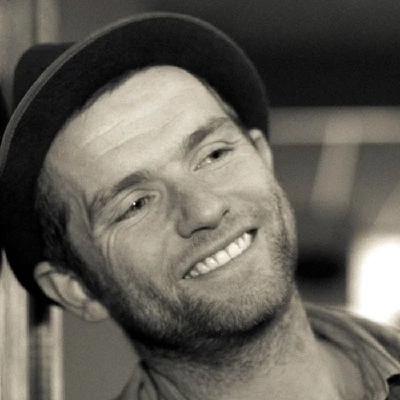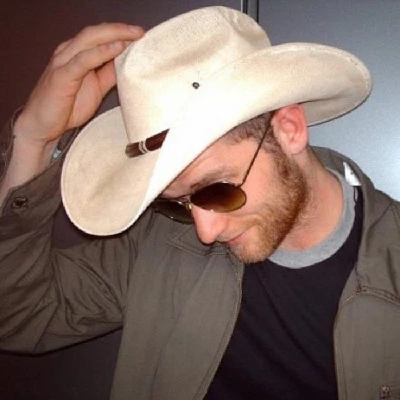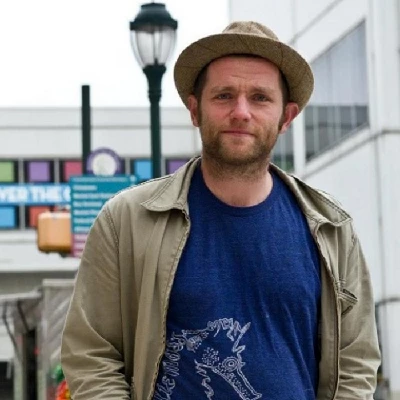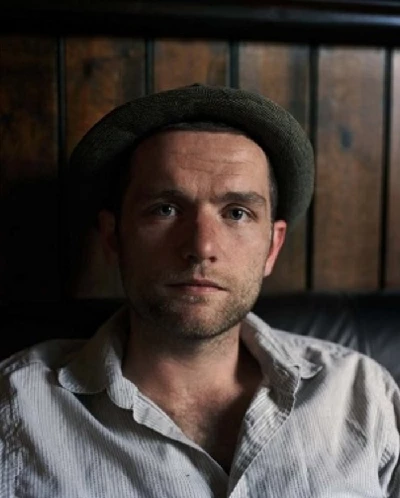published: 23 /
2 /
2013
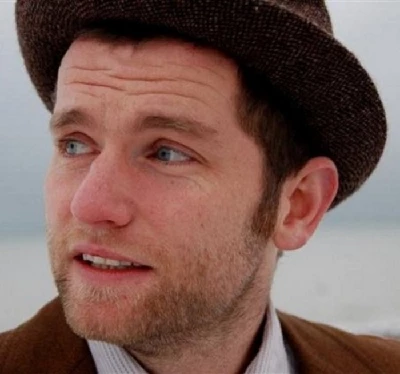
Ben Howarth speaks to critically acclaimed singer-songwriter David Ford about his forthcoming fourth solo album, 'Charge', and new tour
Article
If you happen to be talking music with a David Ford fan, it is inevitable that you will end up referring to the fact that he’s not very well known. It’s hard to avoid – indeed, in 2011, Ford himself titled his memoirs of a decade as a musician, ‘I Choose This: How To Nearly Make It in the Music Industry’.
Ford’s music is far from inaccessible – his songs have easy melodies and hummable tunes. His lyrics - considerably more nuanced than anything a Damien Rice might come up with – are hardly opaque. He writes acoustic ballads, piano singalongs, rollicking blues and angry political rants. He does so with a little more heart, and considerably more skill, than the average mopey singer-songwriter (though Ford himself hates that term, seeing it as unnecessarily limiting).
In fact, by some people’s standards, Ford has been wildly successful. Reviewing his 2010 show at Camden’s Koko, ’The Guardian’ wrote “it is clear that he is an artist deserving of a far wider audience”, but packing out The Koko is nothing to be sniffed at. He tours regularly, playing to good crowds, and not just in Britain - he also has a decent following in the US. These aren’t just happenchance audience members either. They can sing along to every word of every song. Reviewers happily compare him to Tom Waits and Bob Dylan (while I would also suggest fans of Ed Harcourt, Duke Special, the Eels and Gomez will feel at home with him).
But, as he prepares to release his fourth album as a solo artist (you may also recognise him as the frontman of early noughties alt-rock nearlymen Easyworld), Ford has accepted that his audience will be a word-of-mouth affair only. It is unlikely much of the music press will even bother to review it. That shouldn’t stop Pennyblackmusic readers though. It isn’t often that you find songwriters with exceptional decade-old back catalogues, after all.
For my part, I had missed his music entirely until being introduced to him by my girlfriend, who shares Ford’s hometown of Eastbourne. She took me to see him play a smaller-than-usual show at The Boogaloo in North London. Armed with a variety of instruments and a loop machine, Ford’s songs ranged from the delicately fragile to the insanely loud – so loud, in fact, that the venue’s safety system kicked in and shut the electricity off. It was quite a night. I left a lifelong fan, of course.
I spoke to David on a Thursday evening, a few weeks before the release of ‘Charge’, the aforementioned new album. It was a wide ranging discussion – lasting the best part of an hour – and what follows is a summary of a fascinating conversation. I could have quite happily carried on talking to him for much longer. If you want to know more, I heartedly recommend his book (signed copies available from his website), a refreshingly frank account of life on the lower rungs of the music industry.
I began by asking about that new album…
DF: I recorded it on my own, in the basement of where I live, in a pretty small room with a load of musical instruments. I recorded it as I went over a period of about two years. The only other person on the album is Hannah Peel, playing violin. Any of the songs that have these lush string sections, that is actually Hannah playing the same thing over and over again, until it thickens up and becomes an orchestra.
I’ve never really been one for writing lots and lots of songs – some people write 35 songs and then they choose ten for the album – I normally write ten songs and that is the album. But this time, it was a little different because, as I was going, every time I got five songs together – I tried to write them in little thematic bunches – I put an EP out.
So, while it’s not quite a compilation of those EPs, some of the songs are the same. There are no songs that are exactly the same – at the very least they have been remixed and remastered. Some have new vocals and extra guitars, others have been stripped down to the bare bones and re-assembled. Then, the song ‘Every Time’ I just completely re-started from scratch.
PB: I remember the first EP in that series coming out, and I got the impression then that you were planning to release the series of EPs instead of an album. When did you decide that you would – as well as having a couple of new EPs each year – pull certain tracks together into a full length album?
DF: The plan is that there is no plan. You may have an idea of how you think things are going to pan out, but in the end, it doesn’t matter. It might be considered by some not to be a particularly good position to be in, but – basically – the world doesn’t really give a shit what I do. No one is waiting for my next move, so my next move can be whatever I want. Or I can just not make a next move.
So that is actually a really nice position to be in – I don’t feel any pressure to do anything at all, to ever make any music – so the fact that I do is only because I want to and because I still think that I can.
The idea behind the EPs was mostly that I hadn’t put anything out for a while, so here are five songs that seem to hang together and do a job – let’s go on tour. There was always a presumption that I would eventually make another album and some of these songs would be considered for it.
PB: Were you responding to comments and feedback from other people on what songs should be on the album? There have already been comments from fans surprised that certain songs hadn’t been included – a lot of people seem to really like ‘Medicine Show’ from the ‘Tennessee’ EP, for example.
DF: Well, I always keep my own counsel. If by other people, you mean my beloved audience… I try to maintain a relationship with my audience that is respectful, but at the same time, I don’t really like the modern phenomenon of art being interactive. I think it should be a dictatorship. I don’t mean that in an aggressive way, not at all, but I think that the role of the artist is to present what you believe people should hear to them, and it is up to them to either respond positively or negatively. So I always kind of reserve the right to make a record that people don’t like, even if they like my previous stuff. I don’t think that my role is just to please people and shift records. I honestly believe that music is important, and it should be an honest and sincere affair.
PB: I completely agree with that. I was thinking as you spoke that I wouldn’t want to vote on my favourite Bob Dylan tracks for his next album. I would want him to pick the songs he wanted and follow whatever crazy idea he had…
DF: You would never, ever tell Bob Dylan what he should be doing. Dylan’s a great example, because he has made records that I cannot stand. The man is a genius and I love him, and, even the albums I can’t listen to, I admire him for doing them. I’m not trying to say I am like Bob Dylan, but you should try and aspire to walk in those footsteps, rather than just try and be successful in the modern marketplace. I’ve never been one to try and fit in with the marketplace.
PB: That ties in with the comments you have made around the release of this new album, where you have said that you are uncomfortable with the idea of ‘fan funding’.
DF: I just think it is a bit tacky, really. I feel that recording music doesn’t have to be expensive. I know I am in an advantageous position, because when there was a bit of money coming in, I was able to buy some very modest studio equipment and set up my own studio. But even without that, I sort of feel that I would call in some favours, and beg, borrow or steal to put my album together.
It feels like an easy way of doing it – just to ask people to pay in advance. Whereas, like I said before, I reserve the right to make a bad album, and it’s very important to me that I am able to make a bad album, if that is what I have got in me. But it is also important that if I do make a bad album, people have got to be able to not buy it.
It is almost the sense of entitlement that I object to – “it’s my right to make a record and you must pay for it”. Personally, I think you should have to make sacrifices. I think there is a sick part of me that enjoys the struggle – making a record should be traumatic, and if it’s not been, you haven’t done it properly. Just suffer a bit – put it on yourself to stump up the money if you need it, and do it yourself, don’t get other people to raise the money for you.
PB: I completely agree. I think what I object to is the idea that, if the money wasn’t available in advance, then the band would somehow stop making music. I think if that is the case, it can’t really be a passion – if you wouldn’t do it without money.
DF: I am uncomfortable with the combination of money and music. I think if you put them together, money always wins. I have a terrible relationship with money. I honestly don’t know how much money I have in my bank account, though I know that my manager phones me up to tell me I’m broke. But I’m Okay with that, I have always been broke, ever since I was a student. I’m no better off now than I was then, and I could go and work in McDonalds and take a significant pay rise. But I have the best job in the world. Only yesterday, for example, my job was to book a few hotel rooms and make an Evel Knieval costume.
PB: It sounds like there is a story there…
DF: Well, it comes back to this thing about there being no plans. It may never come to anything. A lot of what I do the world never sees – ideas that I think will be great that turn out terrible. So, it is for a video that we are probably going to shoot at the weekend, which involves an Evel Knieval outfit. It may never happen, but now, whatever happens with the video, if I ever need an Evel Knieval costume, I’ve got that covered.
PB: You mention playing almost every instrument on this album. Have you always played such a wide range of instruments?
DF: When I started in Easyworld, I was just a guitar player. I wouldn’t say I was a great guitar player either – I know the chords and a few passing tricks, but I can’t solo to save my life. Soloing is something I have only started to do on this album, and it is not because I have any great confidence in my ability to do it. But it is a sound that I always thought I would want, so I practiced really hard and painstakingly worked out some lead guitar parts.
But I am just a musical enthusiast – I just love it. If I see something being played, I want to work out how to do it. My worst trait is that I pick something up, but only so that I can bluff my way through, I don’t then get any better. So I think I am decent at lots of instruments, but not an expert at anything.
Except that I am pretty shit hot with the loop machine, which helps. I bought the loop machine around the time Easyworld was ending, and it was one of the reasons I wanted to play on my own. It was really exciting. At that time, I didn’t know of anyone else who used one, and it kind of felt like I had invented it. When I use the loop machine, I am just putting down three chords each time, anyone could do that. But the knack is keeping all the strands together and staying on top of it. Using a looper was really nice and liberating – but there is also a kind of fear, because at any moment you can screw it up and it stays screwed up.
PB: I also wanted to ask about your plans for your forthcoming tour – where you are touring with two other songwriters. The plan is for all three of you to play during each set, am I right?
A: It is kind of an idea that I have wanted to do for a long time. It gets lonely sometimes playing as a solo artist, but having a full band gets cumbersome and expensive. I play a bit of this and a bit of that, and I thought it would nice to get people who do a similar thing, so we could all play on each other’s songs.
So the guys that are coming over are two American songwriters – Jarrod Dickinson, who I played with in Philadelphia and Emily Grove, who I played with in New Jersey, where she is from. We’re going to get together a few days before the tour, and we’ll hang out and play a bit. Music is a universal language, and they know my songs and I know theirs, so I think we will be fine.
Ideally, it would be nice not to even have a headliner, just a real free-for-all, but they are both new to touring the UK, so this will be just my tour, but if it goes well, I may suggest doing a couple of co-headline tours in the future.
PB: What about your plans after these tours?
DF: Again, I kind of have no idea. I suppose there is only so long you can tour behind an album before you move on. But the summer is always baffling in terms of a lack of any action – because, even though I love playing festivals and always make an extra effort with those shows, I am never booked for any. And I understand that, because I don’t have the kind of profile. I feel like festivals are booked more on the basis of the buzz around your media profile than your ticket sales. Why would anyone leave a band on the main-stage to see me in a tent if they had never heard of me?
I feel like I am always being self-deprecating, trying to explain why I’m not booked for festivals, why I am not well known. But I really get it, and I don’t think any of it is an indictment of the music. There are people who get angry on my behalf – I just want to tell them to calm down a bit. I sing my songs, we all enjoy it, it’s great. What I do is untouchable, recession proof. I am immune to fashion or a music industry that has no idea where it is going. I’m really happy doing what I love.
I suppose it comes back to this entitlement thing – music doesn’t owe me a living. If it ceased to be my job, I wouldn’t feel like people had let me down. It would just be one of those things.
PB: So much of this is being down to luck – releasing an album in the right month, getting on a magazine cover, having the right people champion your record.
DF: The music industry, I think, can’t market music as music. It only works if it is a lifestyle accessory. It seems easier to get a market for some very difficult indie music. I’ve got friends who are into some of that, and I just can’t listen to it. It’s just a fucking mess. Don’t get me wrong, I’m all for bad playing and bad singing sometimes, but it has to have some serious spirit to it. But there is music that I totally don’t get – other than that I totally get how you would market it. That is music that is as much about hair and clothes as any pop artist. Though the artists involved would never admit it, what they actually are is a lifestyle accessory. For me, I’m just happy doing my tours and selling a couple of records, and then doing it all over again.
PB: You are also working with a new American label for the first time on this album. I’m assuming it has been in the works for a while, but only just confirmed.
DF: Well, you say that… Actually, what happens was that my manager rang me and it was about the fifth thing that he needed to tell me about. I’m not saying that to make me look super cool, as if stuff like that doesn’t mean anything to me… but actually, stuff like that doesn’t mean much to me. I’m very glad that someone wants to jump on board, and it will mean more promotion and organisation over there, where it is much bigger and we don’t know how it works. But I can’t get too excited, because I have been there so many times before. It’s not that I am a pessimist, I’m not. I’m really excited to be working in America, I love America. But this is not the deal that is going to make me rich.
PB: Do you feel established in America now – or do you feel like you are introducing yourself each time you begin a tour?
DF: American audiences are wonderful and really appreciative. But I am only really known in three cities on the East Coast – New York, Boston and Philadelphia. Going there is a bit like going to Manchester in terms of audience size. But I don’t feel like I have conquered America. There are parts of America that I just can’t play in because I have absolutely no following.
I guess I have always identified musically with America more than with Britain. All my favourite music is American. There is an attitude towards music that is always slightly different over there – they always seem to cherish and celebrate ‘the greats’ a little more than we do.
PB: Maybe that is just the music industry – the need to have boxes to put everything in. I feel that there is a big gap between how music is sold and how people who listen to music actually want it…
DF: My problem is that I don’t only like one type of music, and it seems that I can’t even focus on any one type of music for any time. It makes my music very difficult to market – it is hard to find what my target audience is. There will be a rock and roll song, and then a country song, and then a traditional ballad and then a weird song where I shout about the Government.
So the idea with this album was to say ‘fuck it’, because I don’t need to find an audience, because it is kind of already there, and if it grows – great. But if it doesn’t grow, it doesn’t matter and I kind of don’t care anymore. That’s not dismissive of my audience, because it’s great that anybody bothers to find what I do and come to my shows. I’m deeply humbled by that.
PB: But that said, you do have a loyal audience that keep coming back – you never see the shows advertised anywhere in advance, but a word of mouth audience keeps coming.
DF: I’m really happy that is the case, and if it wasn’t the case, I wouldn’t have any audience at all. I am never on the radio or certainly never on the TV, and not in the press either. And so it is just people who know who I am and keep coming back – people who trust me to come up with the goods. So it is important to me to keep my standards up, because it’s not like I can rely on an amazing multi-media ad campaign to sell myself.
There have been times in the past where there have been labels or promoters, and they’ve been saying things that sound really keen, and I end up being the one saying they should save their money. It’s kind of romantic in a way – people who see what I do and think that all they have to do is put it in front of people, and it’ll be massive. I am the one saying that it is not going to be massive, and it is fine. I’m not saying I wouldn’t like to be better known, but I don’t think the circumstances are right for worldwide success.
PB: That is the theme of the song ‘Every Time’, which you put as a download before ‘Charge’ comes out – that song sums up that attitude, and its words are almost your book distilled into a couple of verses and a chorus.
DF: That’s exactly what the thinking was with that song. I wrote that song as I wrote the last few chapters of the book. Songs for me tend to come accidently, and it was really while I focusing on trying to sum up the story of the last ten years into a conclusion that at the same time it formed a little tune in my head. But it then took about a year for the song to really come together, I never pushed it.
PB: Are there times when – and I know its never as simple as this, but – when you have an idea and pick up the guitar and write the whole song as it appears on the record? Or does every song require rigorous re-writing?
A: It works both ways. On my first album, the song ‘I Don’t Care What You Call Me’ was written, recorded and mixed all in one day, after I woke up with the tune in my head. But that is very rare for me. On this album, there is one song ‘Throwaway’, which is one of my favourites on the record, where the idea came and the song was written very quickly. But there are a bunch of songs that took months or even years to pull together.
PB: I know that you always go back to Springsteen, Dylan and Tom Waits for inspiration. Are there any newer artists who you admire as well?
DF: My record collection largely stops at 1978 – before I was born. I’ve pretty much stopped being a music consumer. Every now and then, people who I trust with these kind of things recommend me things – like for example, I really like the Felice Brothers. They’re really good. There is an authenticity to it that I really appreciate. But I often don’t know where to find stuff. That sounds pretty bad for someone who makes my living from people who take the time to find music. It is pretty bad.
This may sound like bullshit, but there is also something to be said for not trying to pollute the songs that are in my head. Sometimes that can be a real problem, because I find it very hard to focus on ordinary conversations when I am in the midst of writing a song. So that is partly the reason why I don’t listen to much of other people’s music.
I’ve actually never seen Springsteen live. I got very close once. I was once signed to Colombia in America, his label, and his manager came to my show and invited me to come ‘hang out’ at their tour rehearsal. A full show with the E-street in front of just a handful of us. But I couldn’t go, because I had to drive to my own show in Charlottesville. And when I got there, fourteen people showed up. I was up on stage thinking, ‘I could have been hanging with the Boss…’
But, actually that was a really lovely show. When I get a small crowd, I try and go that extra way to make sure that those fourteen people have a really memorable evening. I see those shows as the real mark of professionalism, that’s when you really show what you’ve got.
PB: That seems like a good place to end. Thank you.
Band Links:-
http://davidfordmusic.com/
https://en-gb.facebook.com/davidfordmu
https://twitter.com/davidfordisdead
Picture Gallery:-
